Causes of Male Infertility: A Closer Look
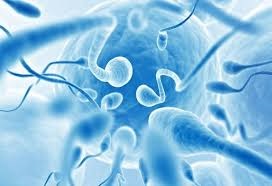
Male infertility is a significant and often overlooked aspect of reproductive health. While discussions about infertility frequently focus on female factors, it’s important to recognize that men contribute to approximately 50% of all infertility cases. Understanding the causes of male infertility is essential for effective diagnosis and treatment. This article explores the various medical conditions and factors that can contribute to infertility in men, including hormonal imbalances, sperm quality issues, obstructions in the reproductive tract, and genetic factors.
Defining Male Infertility
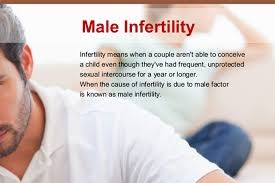
Male infertility is typically defined as the inability to achieve pregnancy after one year of unprotected intercourse. The causes can be multifactorial, involving medical, lifestyle, and environmental factors. The World Health Organization (WHO) defines normal sperm parameters as having a sperm concentration of at least 15 million sperm per milliliter, with motility (the ability to move) and morphology (shape) also being critical factors in assessing male fertility (WHO, 2021).
Hormonal Imbalances in male infertility

Hormonal imbalances play a crucial role in male fertility. The male reproductive system relies on a delicate balance of hormones produced by the hypothalamus, pituitary gland, and testes. Disruptions in this hormonal axis can lead to various fertility issues.
1. Low Testosterone Levels
Testosterone is essential for the development of male reproductive tissues, sperm production, and libido. Low testosterone levels can result from various conditions, including:
- Hypogonadism: A condition where the testes produce insufficient testosterone. It can be primary (originating in the testes) or secondary (due to issues in the hypothalamus or pituitary gland).
- Obesity: Excess body fat can lead to lower testosterone levels due to increased conversion of testosterone to estrogen in adipose tissue.
2. Luteinizing Hormone (LH) and Follicle-Stimulating Hormone (FSH)
Both LH and FSH are produced by the pituitary gland and are crucial for stimulating the testes to produce testosterone and sperm. Abnormal levels of these hormones can disrupt sperm production. Conditions such as pituitary tumors or genetic disorders can affect their secretion.
3. Thyroid Hormone Imbalances
Thyroid hormones also play a role in male fertility. Hypothyroidism (underactive thyroid) and hyperthyroidism (overactive thyroid) can disrupt hormone balance and impact sperm production. Men with thyroid disorders may experience alterations in libido, erectile function, and overall fertility.
Sperm Quality Issues
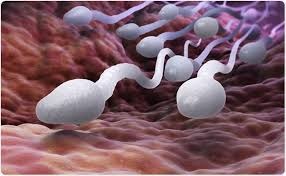
Sperm quality encompasses several factors, including sperm count, motility, and morphology. Poor sperm quality can lead to difficulties in conception.
1. Oligospermia
Oligospermia refers to a low sperm count, typically defined as fewer than 15 million sperm per milliliter of semen. Various factors can contribute to this condition:
- Infections: Certain infections, such as sexually transmitted infections (STIs) or urinary tract infections (UTIs), can affect sperm production or quality.
- Environmental Factors: Exposure to environmental toxins, such as pesticides, heavy metals, and industrial chemicals, can negatively impact sperm count.
- Lifestyle Factors: Smoking, excessive alcohol consumption, and drug use (such as anabolic steroids) can impair sperm production and quality.
2. Asthenozoospermia
Asthenozoospermia is characterized by reduced sperm motility, meaning that sperm have difficulty moving effectively. Poor motility can hinder the sperm’s ability to reach and fertilize an egg. Factors contributing to this condition may include:
- Genetic Abnormalities: Certain genetic conditions, such as Klinefelter syndrome, can affect sperm motility.
- Medical Conditions: Conditions such as diabetes, cystic fibrosis, or hormonal disorders can also impair sperm motility.
3. Teratozoospermia
Teratozoospermia is defined by the presence of abnormally shaped sperm. Irregular sperm morphology can reduce the chances of successful fertilization. Factors contributing to teratozoospermia include:
- Genetic Factors: Genetic anomalies can lead to abnormal sperm development.
- Environmental Exposures: Exposure to radiation, heat (e.g., from saunas or hot tubs), and certain chemicals can adversely affect sperm morphology.
Obstructions in the Reproductive Tract
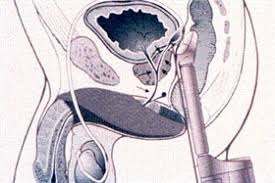
Obstructions in the male reproductive tract can prevent sperm from being delivered during ejaculation, leading to infertility. Various conditions can cause such blockages:
1. Congenital Absence of the Vas Deferens
Some men are born without a vas deferens, the tube that carries sperm from the testes to the ejaculatory duct. This condition is often associated with genetic disorders like cystic fibrosis and can lead to infertility.
2. Infections and Inflammation
Infections in the reproductive tract, such as epididymitis (inflammation of the epididymis) or orchitis (inflammation of the testes), can lead to scarring and obstructions. Chronic infections can result in permanent damage to the reproductive organs.
3. Trauma or Surgery
Injuries to the reproductive tract or surgeries involving the abdomen or pelvis can cause scarring and lead to blockages. Procedures such as hernia repairs or surgeries for testicular cancer may have lasting effects on fertility.
Genetic Factors
Genetic abnormalities can significantly impact male fertility. Various genetic conditions can affect sperm production and quality:
1. Klinefelter Syndrome
Klinefelter syndrome is a genetic condition caused by the presence of an extra X chromosome in males (47,XXY). This condition can result in low testosterone levels, small testes, and impaired sperm production. Men with Klinefelter syndrome often experience infertility and may require assisted reproductive technologies to conceive.
2. Y Chromosome Microdeletions
Y chromosome microdeletions refer to small deletions on the Y chromosome that can affect sperm production. These deletions can lead to severe oligospermia or azoospermia (the absence of sperm in semen). Genetic testing can identify these microdeletions, allowing for tailored treatment options.
3. Other Genetic Disorders
Other genetic conditions, such as Turner syndrome and androgen insensitivity syndrome, can also affect male fertility. Genetic counseling may be recommended for individuals with a family history of infertility or genetic disorders.
Lifestyle and Environmental Factors that influences in fertility in males
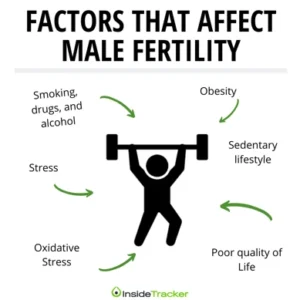
In addition to medical conditions, various lifestyle and environmental factors can influence male fertility:
1. Obesity
Obesity is associated with hormonal imbalances that can adversely affect sperm production and quality. Excess body fat can lead to lower testosterone levels and increased estrogen levels, which can impact fertility.
2. Substance Abuse
Substance abuse, including alcohol, marijuana, and recreational drugs, can impair sperm production and quality. Alcohol consumption can lead to hormonal imbalances, while marijuana use has been linked to lower sperm counts and altered sperm morphology.
3. Heat Exposure
Excessive heat exposure can negatively affect sperm production. Activities that raise the temperature of the testes, such as using hot tubs, saunas, or wearing tight clothing, can impair spermatogenesis (the production of sperm).
4. Environmental Toxins
Exposure to environmental toxins, such as pesticides, heavy metals, and industrial chemicals, has been linked to decreased sperm quality and fertility. Men in occupations with high exposure to these substances may be at increased risk for infertility.
Conclusion.
Male infertility is a multifaceted issue influenced by a range of medical conditions and lifestyle factors. Hormonal imbalances, sperm quality issues, obstructions in the reproductive tract, and genetic factors all contribute to the challenges men face in achieving conception. By understanding the causes of male infertility, healthcare providers can better diagnose and treat individuals struggling with reproductive issues.
Raising awareness about male infertility is crucial for promoting a holistic approach to reproductive health. Couples facing fertility challenges should be encouraged to seek comprehensive evaluations that consider both partners’ health. As societal attitudes toward infertility evolve, greater understanding and support can help reduce the stigma associated with male infertility and foster a more compassionate approach to those affected.
References
- World Health Organization (WHO). (2021). “Infertility.” Retrieved from WHO website.
- American Urological Association. (2018). “Evaluation of the Infertile Male: AUA Guideline.” Retrieved from AUA website.
- Jarow, J. P., et al. (2018). “The Evaluation of the Infertile Male: AUA Guidelines.” The Journal of Urology, 199(4), 1007-1016.
Written by Fawzi Rufai, Medically Reviewed by Sesan Kareem